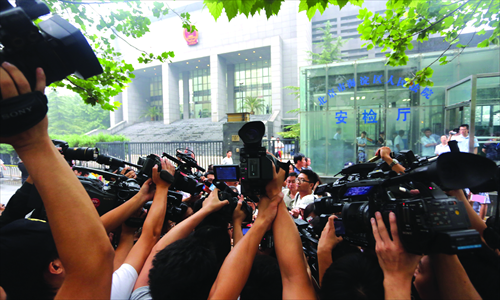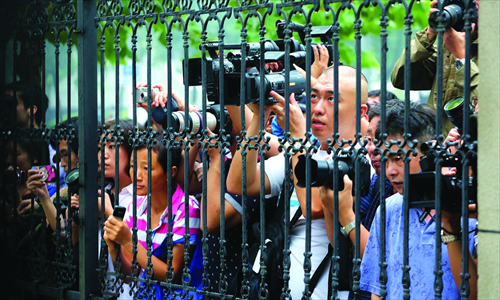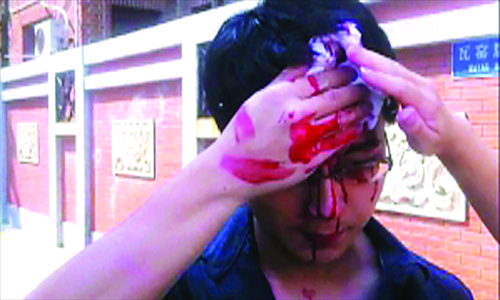Sinking headlines

Reporters crowd to cover a gang rape trial involving a teenage son of two renowned Chinese singers outside the Haidian District People's Court in Beijing on August 28. Photo: CFP
Not long after China's top press regulator announced the country's first national mandatory examination for all media workers, a journalist publicly confessed to misconduct on national television.
Chen Yongzhou, a journalist with the Guangzhou-based New Express, was detained by the police in Changsha, Hunan Province, on October 18 for allegedly receiving bribes and writing false reports on Zoomlion, a listed construction machinery maker in Changsha.
The public showed widespread support for Chen and condemned police attempts to protect local corporate interests and interfere in press freedom. New Express demanded the release of Chen on its front page for two days in a row.
But then there was a dramatic twist. Chen confessed on CCTV that he had received a total of 500,000 yuan ($82,000) in bribes. The alleged briber's identity is still unknown.
The case brought up questions about journalistic ethics, the shaky status of reporters and press freedoms in China. The thorny fact remains that many have sought to leave the industry as they believe their journalistic ideals have been crushed and journalistic culture has been corrupted.

Reporters crowd to cover a gang rape trial involving a teenage son of two renowned Chinese singers outside the Haidian District People's Court in Beijing on August 28. Photo: CFP
Uncrowned kings?
Chen's case is not an isolated one, but the result of a disease that has built up over time, said a journalist with 35 years of experience from one of the Party's flagship publications.
"There are quite a few reporters who are paid for interviews. And some media take payments for negative or positive reports," the retired reporter, who asked for anonymity, told the Global Times.
Some also simply made up news to attract more readers.
In October, a report saying a woman whom an old man fell in love with on the Internet turned out to be his daughter-in-law when they met on their first date at a hotel led to several reposts. One day later, the Heilongjiang Morning Post apologized, saying the report had been fabricated by a journalist.
Journalists had been lauded as "uncrowned kings" due to their independent opinion and social supervision. It was formerly a high-status job in China.
"If you were late for the bus after doing interviews in the countryside, people were happy to offer you a free ride when you showed your press card," recalled the veteran, who became a reporter in 1975.
Journalists also had priority on trains and enjoyed free entrance at scenic spots. "In the public's eyes, journalists were the embodiment of justice," he noted.
Parents also liked to send their children to study journalism. According to official statistics, the number of schools or colleges offering journalism and communications courses grew to 899 by the end of 2009 from 16 at the end of 1982. The number of graduates went from several hundred to tens of thousands.
"Nevertheless, that respect did not come from the news itself, but from people's faith in authority and the shortage and simplicity of information in that period," the veteran said.
Now, the situation has changed. Reporters often have their mobile phones or tape recorders destroyed, are attacked by thugs, or even illegally pursued across boundaries by local police.
A survey released in August polling graduates from the School of Journalism and Communication, Huazhong University of Science and Technology, showed that 85 percent of parents do not support their children working in the media. According to the results, 13.85 percent have transferred from the traditional media to other industries. Among the job hoppers, 12.5 percent chose public relations and 8.43 percent chose new media.
Many reporters said their belief in journalism's ability to fight for equality and justice is fading.
"Write stories, meet the quota and earn money. There's nothing special," said Xiao Jun (pseudonym) from a Beijing-based newspaper. "Sometimes we have to filter stories and bow to pressure from advertisers or authorities."
Xiao said he was recently surprised to find that over half of his peers have already shifted to other jobs.
"My income this month was reduced by 30 percent. Newspapers have entered a great recession as advertising client numbers have dropped greatly," Xiao said, adding he is also planning to go into business on his own.
While some reporters plan to leave the field, others are trying hard to enter it. A press card, even a fake one, means a high return for some people.
In February, Li Deyong, a journalist with Shopping Guidance, was found to have charged about 10,000 yuan to obtain press cards for applicants. Li even established a press base in Jiangsu's Lianyungang and organized dozens of others, including his ex-wife and cousin, to blackmail interviewees by threatening to run negative news. On February 29, Li and five others were detained. The trial, which began in October, is ongoing.

Lu Yaoyao, a reporter from Nanyang TV, attempts to stop his bleeding after being attacked by two men while investigating an unlicensed parking lot in Guangzhou on October 19, 2011. Photo: IC
High stress
Stress has contributed to some reporters' decision to quit.
In June, Life Times listed media worker as one of the jobs with the highest risk of sudden death, based on a survey by the Chinese Medical Doctors Association. The survey, after checking 3 million physical tests, placed media fourth on the list of the top 10 most stressful industries, after manufacturing, finance and education.
"To be a good reporter, you have to keep your eyes and ears open and stay alert. It's hard to stick to it as it's fast-paced and drains your energy," said Sun Rongfei, who moved to a State-owned company from a private weekly despite the lower pay, seeking a more stable position.
However, many others left just because of the deteriorating culture.
"I saw no career promotion apart from repeated writing and editing. I want to try some new challenges," said Zhang, who was a reporter for a Yunnan-based newspaper for eight years.
"Besides, I'm finding it hard to adapt to the atmosphere of journalism, in which many reporters or media are competing for profit rather than quality of the reports. Some even fan up conflicts," he told the Global Times.
Last year, Zhang resigned and became a marketing planning director for a cosmetic company.
Qiu Ziming, a journalist with the Economic Observer, said the current journalism culture is unhealthy. "The reporters turn to forming their own cliques and there is growing intolerance of dissent," he said.
Qiu was put on the national wanted list by local police after he reported a trading scandal involving a Zhejiang-based company in 2010. Some reporters continued to accuse him of receiving bribes even though the police eventually apologized.
Others fear the decline of traditional media due to the rising power of social media. It's a global trend, but China has its own problems.
Liu Zhouwei, founder and editor-in-chief of 21st Century Business Herald, announced on his microblog in August that he had resigned from the newspaper and planned to move into new media.
Some took the step much earlier. Xiong Hao quit his job as a deputy chief editor for Guangzhou-based Time Weekly in 2011 and opened his own advertising company.
"Newspapers and periodicals are losing influence. The advertisers now favor outdoor facilities, Internet and TV. Print media is no longer attractive," Xiong told the Global Times.
Nevertheless, the anonymous reporter from the Party's flagship publication attributed the problems to the current system, which divides the media into State-run outlets and market-oriented ones.
China has about 11,800 newspaper and periodicals, many of which were formerly run by the State but were forced to commercialize last year.
"The State newspapers monopolize access to the high-end news release and press conferences. To some extent, it forces some of the latter ones toward low-end reports, even trading news for money," he said. "The double-track system has generated gaps between different media. Then reporters from both sides become sluggish and degraded."
Jin Jianshu, a reporter from a Party newspaper in Zhejiang Province, said they also feel the pressure to make profits as the authorities have cut their funds.
"We wear shackles [restrictions], at the same time we have to explore the market," he told the Global Times.
Mandatory Marxism
At the end of September, the General Administration of Press and Publication, Radio, Film and Television (GAPPRFT) issued a notice, demanding all press organizations across China arrange on-the-job training and post examinations on their staff, so as to "improve staff's quality" and "clean industrial maladies."
At a video interview by people.com.cn on October 24, Men Lijun and Nong Tao, two officials with the newspapers and periodicals department of the GAPPRFT, said that a total of 250,000 journalists with press cards and about 30,000 to 50,000 workers without cards from 6,778 press units will undergo the training and sit exams.
Men stressed that offenses and wrongdoings by media staff have constantly occurred despite repeated prohibitions. "Some reporters have lost their belief, have poor legal awareness and lack a sense of social responsibility. Some individuals or units even illegally run false or paid news or cons," he said.
The courses will include theories on socialism with Chinese characteristics, the Marxist view on journalism, journalistic ethics, laws and regulations, norms in news writing and editing, and preventing false information. Failure will require makeup tests.
In early November, the authorities in Henan Province announced a month-long crackdown on bogus reporters and fake media across the province.
Zhang Zhian who led the country's first survey of investigative reporters, and now vice president of the School of Communication and Design, Sun Yat-sen University, said that only by being independent from commercial benefits can the media follow journalistic ethics.
"[This] does not depend on self-discipline, but on strong restrictive regulations, layers of content control and supervision, and a scientific payment system," Zhang told the Global Times.
Liu Chang contributed to the story

A reporter takes a nap before a press conference on March 6, 2012. Photo: IC